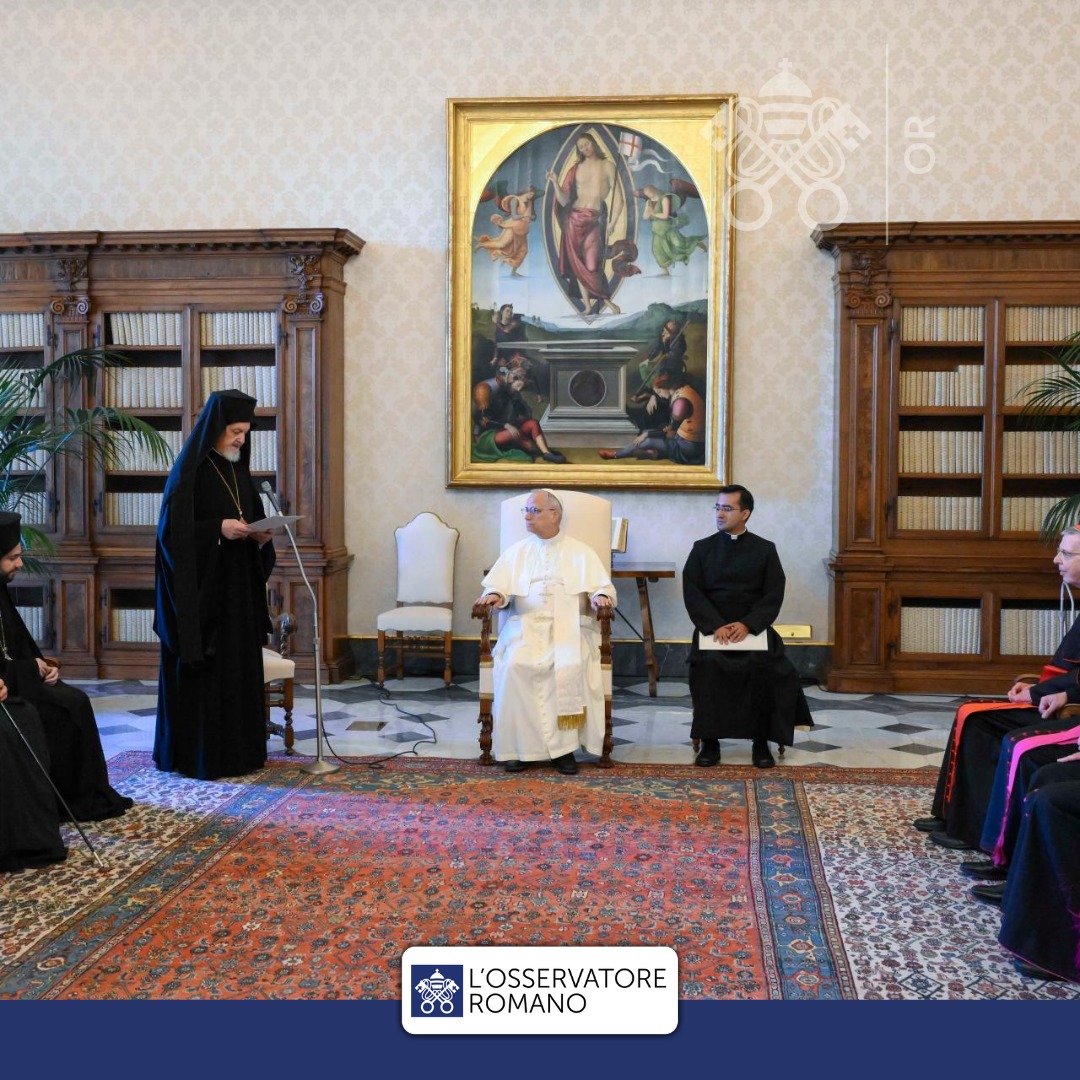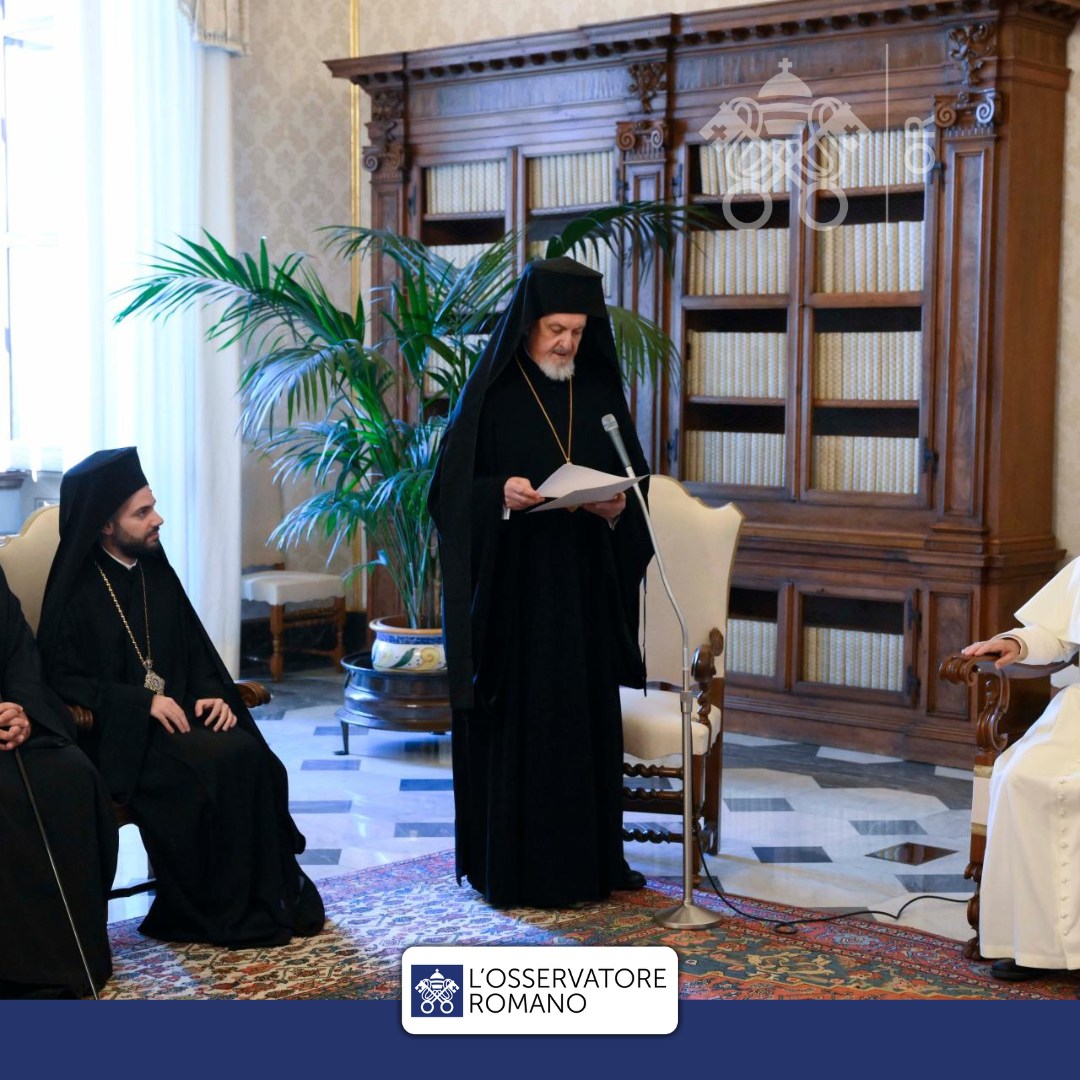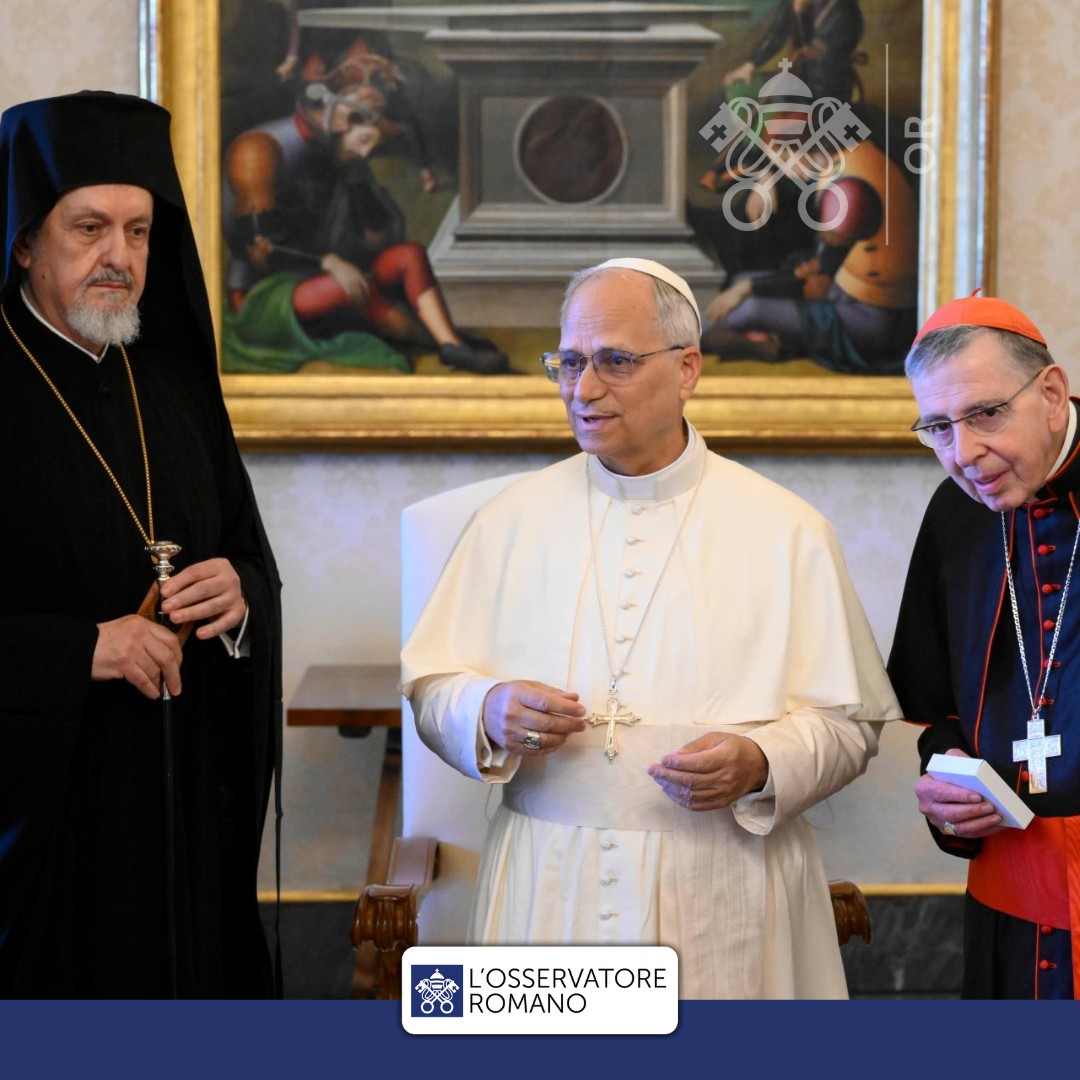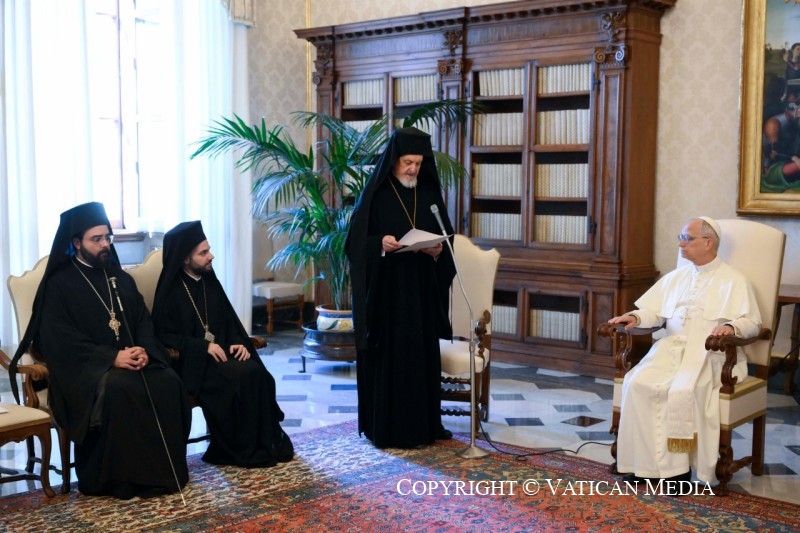Address by His Eminence Elder Metropolitan Emmanuel of Chalcedon to His Holiness Pope Leo XIV on the Occasion of the Thronal Feast of the Church of Rome (Vatican, 28 June 2025)
Your Holiness,
It is with the most profound sense of honour that I stand before you today, as head of the Patriarchal delegation to the Thronal Feast of the Church of Rome, privileged to bring to Your Holiness the heartfelt and fraternal Message of Your beloved Brother in Christ, Ecumenical Patriarch Bartholomew of Constantinople.
As the radiant and glorious dawn of the Thronal Feast of the Holy Apostles Peter and Paul begins to suffuse the ancient and Eternal City of Rome with its unparalleled apostolic splendour, it carries with it more than just the light of a new day. It conveys the warmest greetings and the most fervent intercessions of the Sister Church of Constantinople. With one voice, we are beseeching the Almighty that your Papal ministry may be abundantly crowned with the divine gifts of profound peace and plentiful, life-giving fruit. The very first word that Your Holiness chose to utter upon your election—the simple yet powerful word, “peace”—resounded across the world not as a mere polite convention or a predictable turn of phrase, but as a deeply resonant and urgent evangelical summons. For it was barely a few hours after the hopeful white smoke had risen above the historic Sistine Chapel that You declared, with unmistakable conviction, your unwavering resolve “to make every effort for world peace.”
This innate and universal longing for concord is made all the more intense and poignant by the grievous and sorrowful litany of conflicts that tragically mark our present day. In the lands of Ukraine, the difficult and painful realities that have followed the unjust Russian invasion continue to unfold, casting a long shadow of suffering. We recall, as well, with heavy hearts, the recent war that erupted between Iran and Israel which, though mercifully brief in its duration, managed to inflict a great deal of pain and sow seeds of further instability. We take the opportunity to make an urgent appeal for the preservation and protection of the status quo of the historic Sinai Monastery. We also pray especially for the safety and well-being of the Christians in the Middle East. The deeply troubling situation and uncertainty in this region, most especially the ongoing and devastating crisis in Gaza, and the persistent, complex conflicts raging across the Great Lakes area of Africa, all demand with a crying urgency that comprehensive peace accords be concluded before any more crucial deadlines lapse into utter and heartbreaking futility. These many open wounds upon the body of humanity serve to explain precisely why your inaugural salutation—“Peace be with you all”—was so instantly and widely understood not as a simple liturgical formality, but as the foundational declaration of a pastoral manifesto. Yet, as we know, true and lasting peace is never a mere cessation of hostilities or a simple absence of conflict; it is, in its very essence, a positive and intricate weave of foundational truth and enduring justice.

Our two Sister Churches have been faithfully and hopefully engaged in the profoundly important dialogue of charity since the historic year of 1964, and have been committed to the official theological dialogue since 1980. This very year marks the significant 60th anniversary of the momentous mutual lifting of the 1054 anathemas, a courageous act that powerfully paved the way for a sincere, open, and truly fraternal dialogue to begin. Over these decades, seven important agreed texts have been painstakingly produced and published, eloquently expressing our deeply shared theological tradition and highlighting a remarkable convergence on many of the complex issues that, for centuries, have continued to divide Orthodox and Roman Catholics. The Joint International Commission for Theological Dialogue between our Churches has produced a body of significant and substantial work thus far, to which a number of important and respected theologians from both of our traditions, such as the late Jean-Marie Tillard and Cardinal Walter Kasper, as well as the Elder Metropolitans Meliton of Chalcedon and John of Pergamon, both of blessed memory, have made invaluable contributions. The most recent of these documents, which was signed in the city of Alexandria in the year 2023, thoughtfully addresses the complex topics of primacy and synodality as they developed throughout the second millennium. It presents a common historical account of this very subject in both the East and the West, along with a shared and hopeful perspective for understanding the divisive issue of papal primacy. As the Commission now diligently prepares to undertake the study of the addition of the Filioque to the Nicene-Constantinopolitan Creed and the continuing examination of papal primacy, we hold a well-founded and confident hope that the extensive theological reflection and the dedicated ecclesiological research of these recent decades will contribute decisively to discovering the common ground upon which these traditionally thorny and challenging issues may finally find their peaceful and harmonious resolution.
As we look ahead with anticipation, the seventeen-hundredth anniversary of the First Ecumenical Council of Nicaea stands before us as both a powerful mirror and a guiding lamp. It serves as a mirror reflecting our common origin in the undivided Church, and as a lamp brightly illuminating the path of our still unfinished journey toward full communion. This sacred and sometimes arduous path of reconciliation was pursued with a humble and ever-hopeful persistence by your distinguished predecessor of blessed memory, the late Pope Francis. It is for this very reason, therefore, that we rejoice all the more profoundly to know that Your Holiness intends to continue this blessed pilgrimage of unity. Your plan to do so by visiting the See of the Ecumenical Patriarchate in the historic Phanar and by journeying to ancient Nicaea—the city known today as Iznik—is a pilgrimage that will serve as a vital preparation for this common commemoration with your Brother, Patriarch Bartholomew. The preparatory dialogues for this momentous occasion have already begun to bear promising and encouraging fruit.

Let us fervently pray that the joint celebration of Nicaea becomes the very cornerstone of our renewed and reinvigorated efforts to celebrate the great feast of Easter together, as it has already been proposed. May this not only serve as a powerful and unified witness to our common faith before a watching world, but also function as a decisive and irreversible step towards achieving a common date of celebration for this greatest and most joyous of all Christian feasts. The happy coincidence of the celebration of Easter for East and West on the 20th of April this year has already rekindled a widespread public debate on this matter, and a great many of the faithful from both our Churches tasted that rare and beautiful simultaneity as a deeply welcome foretaste of the full, visible unity for which we so earnestly seek and pray. In this spirit, it is not coincidental that both our Churches have already received hundreds of appeals in favour of this God-pleasing endeavour.
The Risen Christ, in his infinite mercy, breathes the words “Peace be unto you” upon his disciples, who are still locked away in their fear and uncertainty (John 20:19); but He also declares with divine authority that the peacemakers shall be called the children of God (Matt 5:9), clearly implying that peace is not merely a gift to be passively received, but a sacred vocation to be actively pursued. It is in that very spirit that we recall the luminous and inspiring testimony of Saint Paul, whose chains here in Rome became, by a divine paradox, a profound token of true spiritual freedom: “For he is our peace, who hath made both one” (Eph 2:14). May that glorious apostolic paradox embolden every one of our steps. In the meantime, the inspired Psalmist remains our constant and reliable tutor: “Peace be within thy walls, and prosperity within thy palaces” (Ps 122:7). May the Lord who once called the Holy Apostles Peter and Paul, now confirm Your Holiness in every good and noble endeavour; and may the Most Holy Theotokos, the Mother of God, keep this precious fraternity securely beneath her protective mantle until that great and final day when East and West shall at last stand together as one before the throne of Christ and learn, in perfect communion, how vast and magnificent a city can truly be built from the foundations of peace.


